Reflective Practice in Indigenous Health Care
VerifiedAdded on 2023/04/21
|8
|2092
|269
AI Summary
This paper explores the importance of reflective practice in improving health outcomes for Indigenous populations in Australia. It discusses the disparities in health between Indigenous and non-Indigenous individuals and the need for cultural sensitivity in nursing practice. The paper also examines the use of Gibbs reflection cycle to gain insights into Indigenous cultural values and beliefs. Recommendations for improving nursing practice and reducing health disparities are provided.
Contribute Materials
Your contribution can guide someone’s learning journey. Share your
documents today.
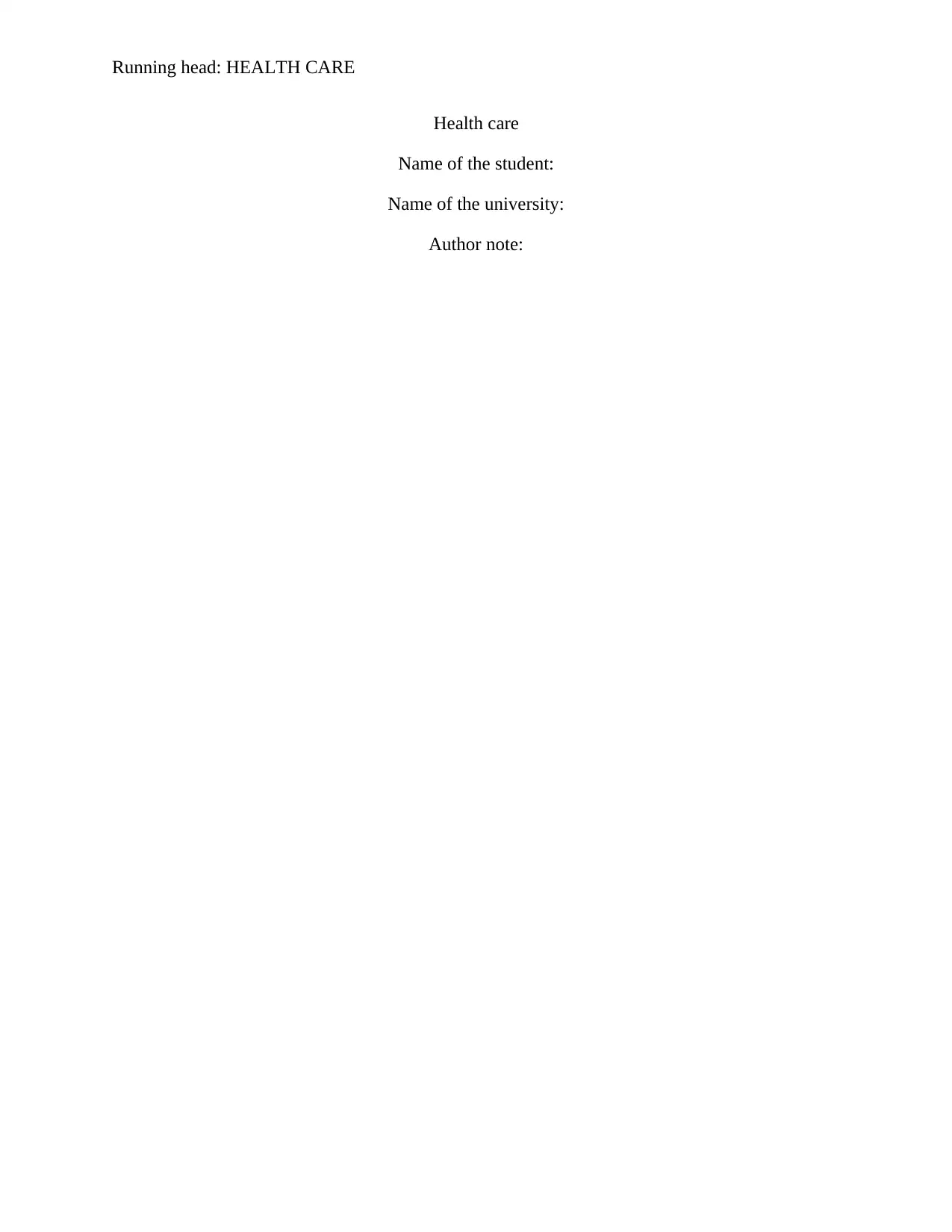
Running head: HEALTH CARE
Health care
Name of the student:
Name of the university:
Author note:
Health care
Name of the student:
Name of the university:
Author note:
Secure Best Marks with AI Grader
Need help grading? Try our AI Grader for instant feedback on your assignments.
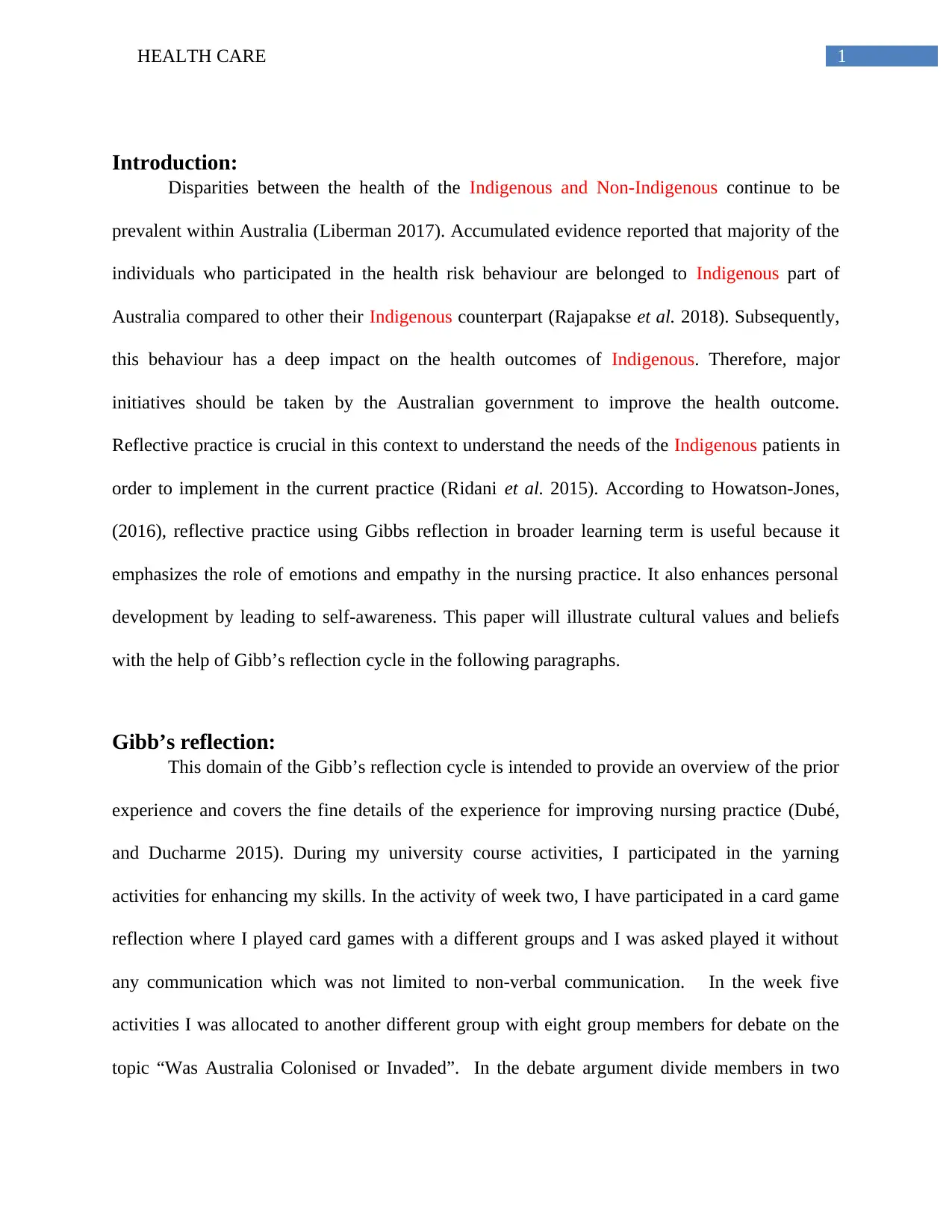
1HEALTH CARE
Introduction:
Disparities between the health of the Indigenous and Non-Indigenous continue to be
prevalent within Australia (Liberman 2017). Accumulated evidence reported that majority of the
individuals who participated in the health risk behaviour are belonged to Indigenous part of
Australia compared to other their Indigenous counterpart (Rajapakse et al. 2018). Subsequently,
this behaviour has a deep impact on the health outcomes of Indigenous. Therefore, major
initiatives should be taken by the Australian government to improve the health outcome.
Reflective practice is crucial in this context to understand the needs of the Indigenous patients in
order to implement in the current practice (Ridani et al. 2015). According to Howatson-Jones,
(2016), reflective practice using Gibbs reflection in broader learning term is useful because it
emphasizes the role of emotions and empathy in the nursing practice. It also enhances personal
development by leading to self-awareness. This paper will illustrate cultural values and beliefs
with the help of Gibb’s reflection cycle in the following paragraphs.
Gibb’s reflection:
This domain of the Gibb’s reflection cycle is intended to provide an overview of the prior
experience and covers the fine details of the experience for improving nursing practice (Dubé,
and Ducharme 2015). During my university course activities, I participated in the yarning
activities for enhancing my skills. In the activity of week two, I have participated in a card game
reflection where I played card games with a different groups and I was asked played it without
any communication which was not limited to non-verbal communication. In the week five
activities I was allocated to another different group with eight group members for debate on the
topic “Was Australia Colonised or Invaded”. In the debate argument divide members in two
Introduction:
Disparities between the health of the Indigenous and Non-Indigenous continue to be
prevalent within Australia (Liberman 2017). Accumulated evidence reported that majority of the
individuals who participated in the health risk behaviour are belonged to Indigenous part of
Australia compared to other their Indigenous counterpart (Rajapakse et al. 2018). Subsequently,
this behaviour has a deep impact on the health outcomes of Indigenous. Therefore, major
initiatives should be taken by the Australian government to improve the health outcome.
Reflective practice is crucial in this context to understand the needs of the Indigenous patients in
order to implement in the current practice (Ridani et al. 2015). According to Howatson-Jones,
(2016), reflective practice using Gibbs reflection in broader learning term is useful because it
emphasizes the role of emotions and empathy in the nursing practice. It also enhances personal
development by leading to self-awareness. This paper will illustrate cultural values and beliefs
with the help of Gibb’s reflection cycle in the following paragraphs.
Gibb’s reflection:
This domain of the Gibb’s reflection cycle is intended to provide an overview of the prior
experience and covers the fine details of the experience for improving nursing practice (Dubé,
and Ducharme 2015). During my university course activities, I participated in the yarning
activities for enhancing my skills. In the activity of week two, I have participated in a card game
reflection where I played card games with a different groups and I was asked played it without
any communication which was not limited to non-verbal communication. In the week five
activities I was allocated to another different group with eight group members for debate on the
topic “Was Australia Colonised or Invaded”. In the debate argument divide members in two
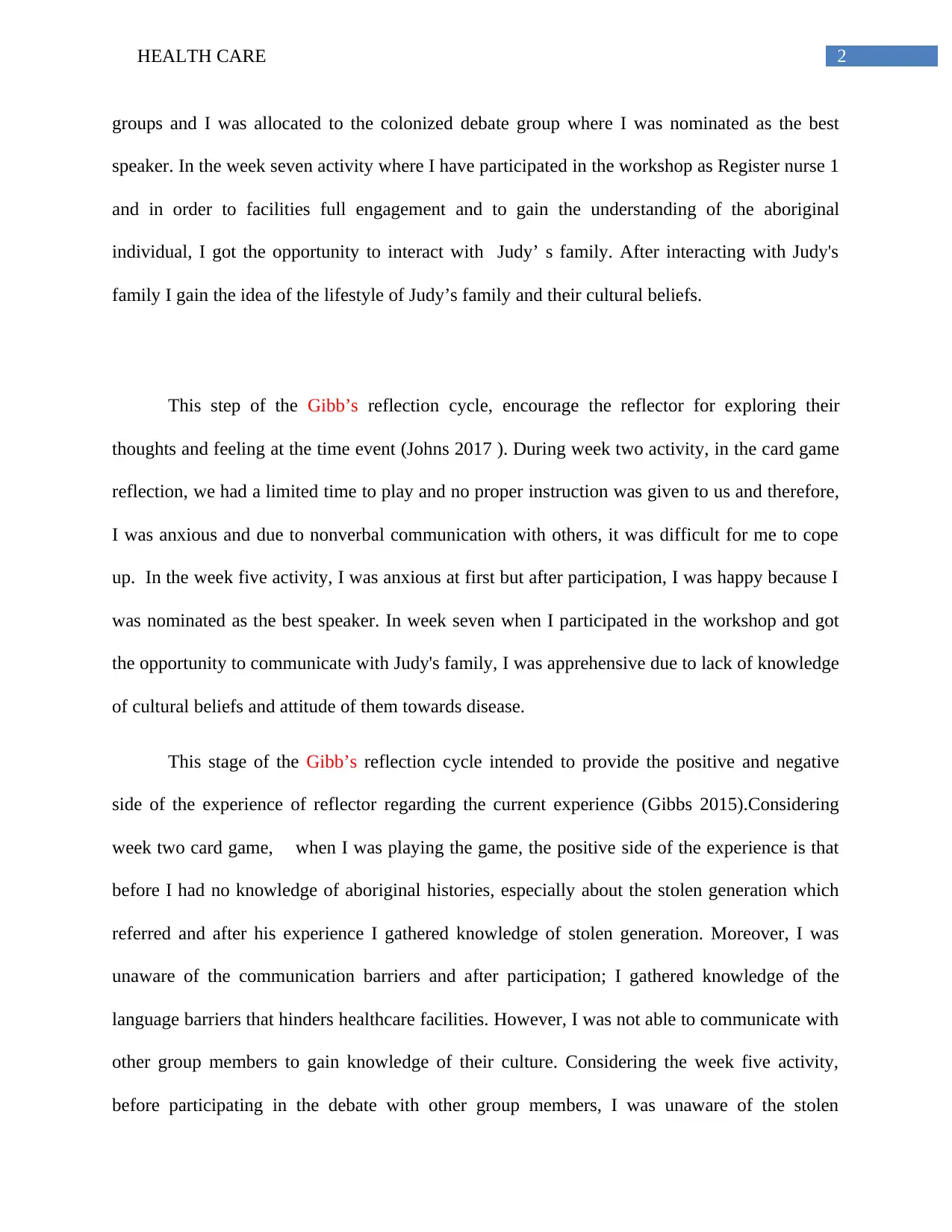
2HEALTH CARE
groups and I was allocated to the colonized debate group where I was nominated as the best
speaker. In the week seven activity where I have participated in the workshop as Register nurse 1
and in order to facilities full engagement and to gain the understanding of the aboriginal
individual, I got the opportunity to interact with Judy’ s family. After interacting with Judy's
family I gain the idea of the lifestyle of Judy’s family and their cultural beliefs.
This step of the Gibb’s reflection cycle, encourage the reflector for exploring their
thoughts and feeling at the time event (Johns 2017 ). During week two activity, in the card game
reflection, we had a limited time to play and no proper instruction was given to us and therefore,
I was anxious and due to nonverbal communication with others, it was difficult for me to cope
up. In the week five activity, I was anxious at first but after participation, I was happy because I
was nominated as the best speaker. In week seven when I participated in the workshop and got
the opportunity to communicate with Judy's family, I was apprehensive due to lack of knowledge
of cultural beliefs and attitude of them towards disease.
This stage of the Gibb’s reflection cycle intended to provide the positive and negative
side of the experience of reflector regarding the current experience (Gibbs 2015).Considering
week two card game, when I was playing the game, the positive side of the experience is that
before I had no knowledge of aboriginal histories, especially about the stolen generation which
referred and after his experience I gathered knowledge of stolen generation. Moreover, I was
unaware of the communication barriers and after participation; I gathered knowledge of the
language barriers that hinders healthcare facilities. However, I was not able to communicate with
other group members to gain knowledge of their culture. Considering the week five activity,
before participating in the debate with other group members, I was unaware of the stolen
groups and I was allocated to the colonized debate group where I was nominated as the best
speaker. In the week seven activity where I have participated in the workshop as Register nurse 1
and in order to facilities full engagement and to gain the understanding of the aboriginal
individual, I got the opportunity to interact with Judy’ s family. After interacting with Judy's
family I gain the idea of the lifestyle of Judy’s family and their cultural beliefs.
This step of the Gibb’s reflection cycle, encourage the reflector for exploring their
thoughts and feeling at the time event (Johns 2017 ). During week two activity, in the card game
reflection, we had a limited time to play and no proper instruction was given to us and therefore,
I was anxious and due to nonverbal communication with others, it was difficult for me to cope
up. In the week five activity, I was anxious at first but after participation, I was happy because I
was nominated as the best speaker. In week seven when I participated in the workshop and got
the opportunity to communicate with Judy's family, I was apprehensive due to lack of knowledge
of cultural beliefs and attitude of them towards disease.
This stage of the Gibb’s reflection cycle intended to provide the positive and negative
side of the experience of reflector regarding the current experience (Gibbs 2015).Considering
week two card game, when I was playing the game, the positive side of the experience is that
before I had no knowledge of aboriginal histories, especially about the stolen generation which
referred and after his experience I gathered knowledge of stolen generation. Moreover, I was
unaware of the communication barriers and after participation; I gathered knowledge of the
language barriers that hinders healthcare facilities. However, I was not able to communicate with
other group members to gain knowledge of their culture. Considering the week five activity,
before participating in the debate with other group members, I was unaware of the stolen
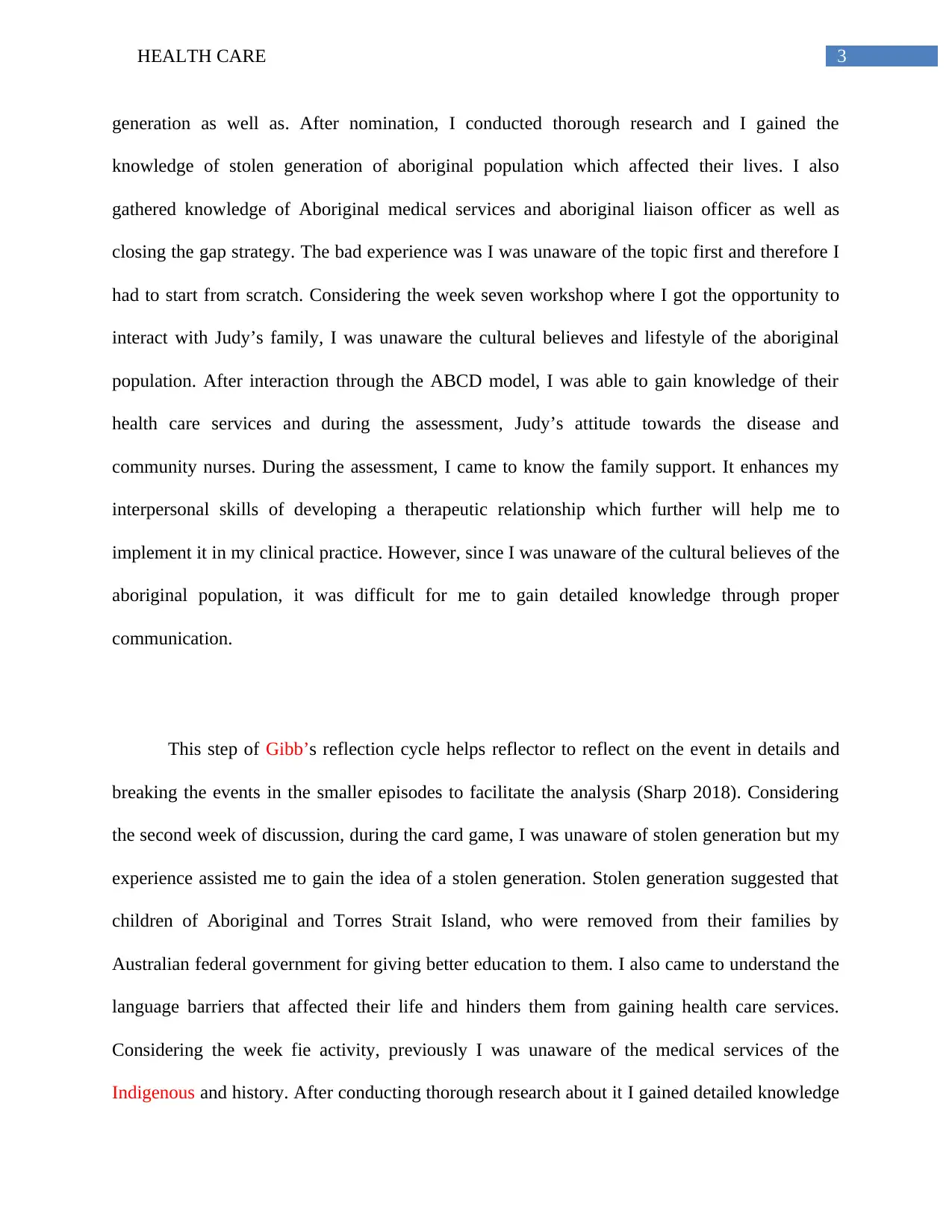
3HEALTH CARE
generation as well as. After nomination, I conducted thorough research and I gained the
knowledge of stolen generation of aboriginal population which affected their lives. I also
gathered knowledge of Aboriginal medical services and aboriginal liaison officer as well as
closing the gap strategy. The bad experience was I was unaware of the topic first and therefore I
had to start from scratch. Considering the week seven workshop where I got the opportunity to
interact with Judy’s family, I was unaware the cultural believes and lifestyle of the aboriginal
population. After interaction through the ABCD model, I was able to gain knowledge of their
health care services and during the assessment, Judy’s attitude towards the disease and
community nurses. During the assessment, I came to know the family support. It enhances my
interpersonal skills of developing a therapeutic relationship which further will help me to
implement it in my clinical practice. However, since I was unaware of the cultural believes of the
aboriginal population, it was difficult for me to gain detailed knowledge through proper
communication.
This step of Gibb’s reflection cycle helps reflector to reflect on the event in details and
breaking the events in the smaller episodes to facilitate the analysis (Sharp 2018). Considering
the second week of discussion, during the card game, I was unaware of stolen generation but my
experience assisted me to gain the idea of a stolen generation. Stolen generation suggested that
children of Aboriginal and Torres Strait Island, who were removed from their families by
Australian federal government for giving better education to them. I also came to understand the
language barriers that affected their life and hinders them from gaining health care services.
Considering the week fie activity, previously I was unaware of the medical services of the
Indigenous and history. After conducting thorough research about it I gained detailed knowledge
generation as well as. After nomination, I conducted thorough research and I gained the
knowledge of stolen generation of aboriginal population which affected their lives. I also
gathered knowledge of Aboriginal medical services and aboriginal liaison officer as well as
closing the gap strategy. The bad experience was I was unaware of the topic first and therefore I
had to start from scratch. Considering the week seven workshop where I got the opportunity to
interact with Judy’s family, I was unaware the cultural believes and lifestyle of the aboriginal
population. After interaction through the ABCD model, I was able to gain knowledge of their
health care services and during the assessment, Judy’s attitude towards the disease and
community nurses. During the assessment, I came to know the family support. It enhances my
interpersonal skills of developing a therapeutic relationship which further will help me to
implement it in my clinical practice. However, since I was unaware of the cultural believes of the
aboriginal population, it was difficult for me to gain detailed knowledge through proper
communication.
This step of Gibb’s reflection cycle helps reflector to reflect on the event in details and
breaking the events in the smaller episodes to facilitate the analysis (Sharp 2018). Considering
the second week of discussion, during the card game, I was unaware of stolen generation but my
experience assisted me to gain the idea of a stolen generation. Stolen generation suggested that
children of Aboriginal and Torres Strait Island, who were removed from their families by
Australian federal government for giving better education to them. I also came to understand the
language barriers that affected their life and hinders them from gaining health care services.
Considering the week fie activity, previously I was unaware of the medical services of the
Indigenous and history. After conducting thorough research about it I gained detailed knowledge
Secure Best Marks with AI Grader
Need help grading? Try our AI Grader for instant feedback on your assignments.
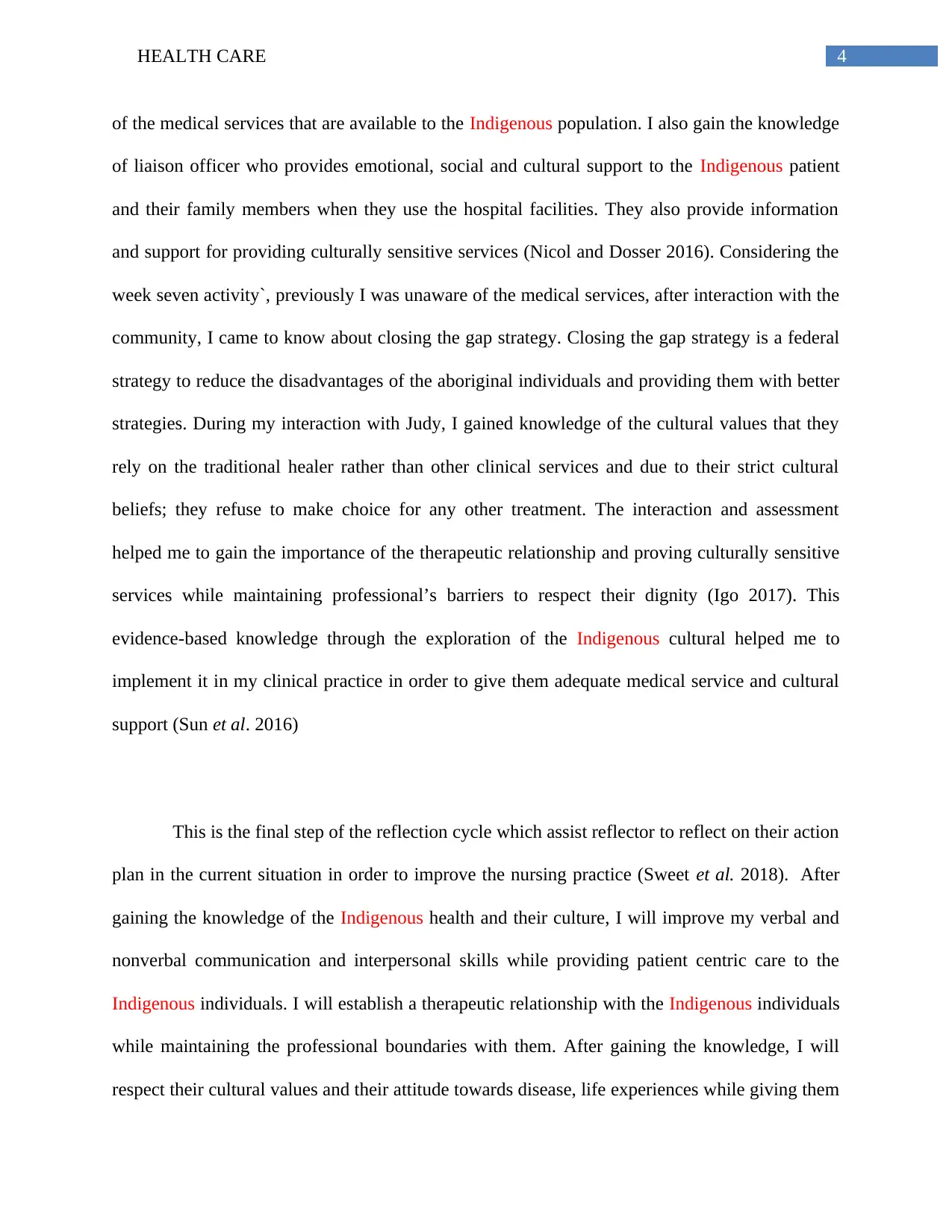
4HEALTH CARE
of the medical services that are available to the Indigenous population. I also gain the knowledge
of liaison officer who provides emotional, social and cultural support to the Indigenous patient
and their family members when they use the hospital facilities. They also provide information
and support for providing culturally sensitive services (Nicol and Dosser 2016). Considering the
week seven activity`, previously I was unaware of the medical services, after interaction with the
community, I came to know about closing the gap strategy. Closing the gap strategy is a federal
strategy to reduce the disadvantages of the aboriginal individuals and providing them with better
strategies. During my interaction with Judy, I gained knowledge of the cultural values that they
rely on the traditional healer rather than other clinical services and due to their strict cultural
beliefs; they refuse to make choice for any other treatment. The interaction and assessment
helped me to gain the importance of the therapeutic relationship and proving culturally sensitive
services while maintaining professional’s barriers to respect their dignity (Igo 2017). This
evidence-based knowledge through the exploration of the Indigenous cultural helped me to
implement it in my clinical practice in order to give them adequate medical service and cultural
support (Sun et al. 2016)
This is the final step of the reflection cycle which assist reflector to reflect on their action
plan in the current situation in order to improve the nursing practice (Sweet et al. 2018). After
gaining the knowledge of the Indigenous health and their culture, I will improve my verbal and
nonverbal communication and interpersonal skills while providing patient centric care to the
Indigenous individuals. I will establish a therapeutic relationship with the Indigenous individuals
while maintaining the professional boundaries with them. After gaining the knowledge, I will
respect their cultural values and their attitude towards disease, life experiences while giving them
of the medical services that are available to the Indigenous population. I also gain the knowledge
of liaison officer who provides emotional, social and cultural support to the Indigenous patient
and their family members when they use the hospital facilities. They also provide information
and support for providing culturally sensitive services (Nicol and Dosser 2016). Considering the
week seven activity`, previously I was unaware of the medical services, after interaction with the
community, I came to know about closing the gap strategy. Closing the gap strategy is a federal
strategy to reduce the disadvantages of the aboriginal individuals and providing them with better
strategies. During my interaction with Judy, I gained knowledge of the cultural values that they
rely on the traditional healer rather than other clinical services and due to their strict cultural
beliefs; they refuse to make choice for any other treatment. The interaction and assessment
helped me to gain the importance of the therapeutic relationship and proving culturally sensitive
services while maintaining professional’s barriers to respect their dignity (Igo 2017). This
evidence-based knowledge through the exploration of the Indigenous cultural helped me to
implement it in my clinical practice in order to give them adequate medical service and cultural
support (Sun et al. 2016)
This is the final step of the reflection cycle which assist reflector to reflect on their action
plan in the current situation in order to improve the nursing practice (Sweet et al. 2018). After
gaining the knowledge of the Indigenous health and their culture, I will improve my verbal and
nonverbal communication and interpersonal skills while providing patient centric care to the
Indigenous individuals. I will establish a therapeutic relationship with the Indigenous individuals
while maintaining the professional boundaries with them. After gaining the knowledge, I will
respect their cultural values and their attitude towards disease, life experiences while giving them
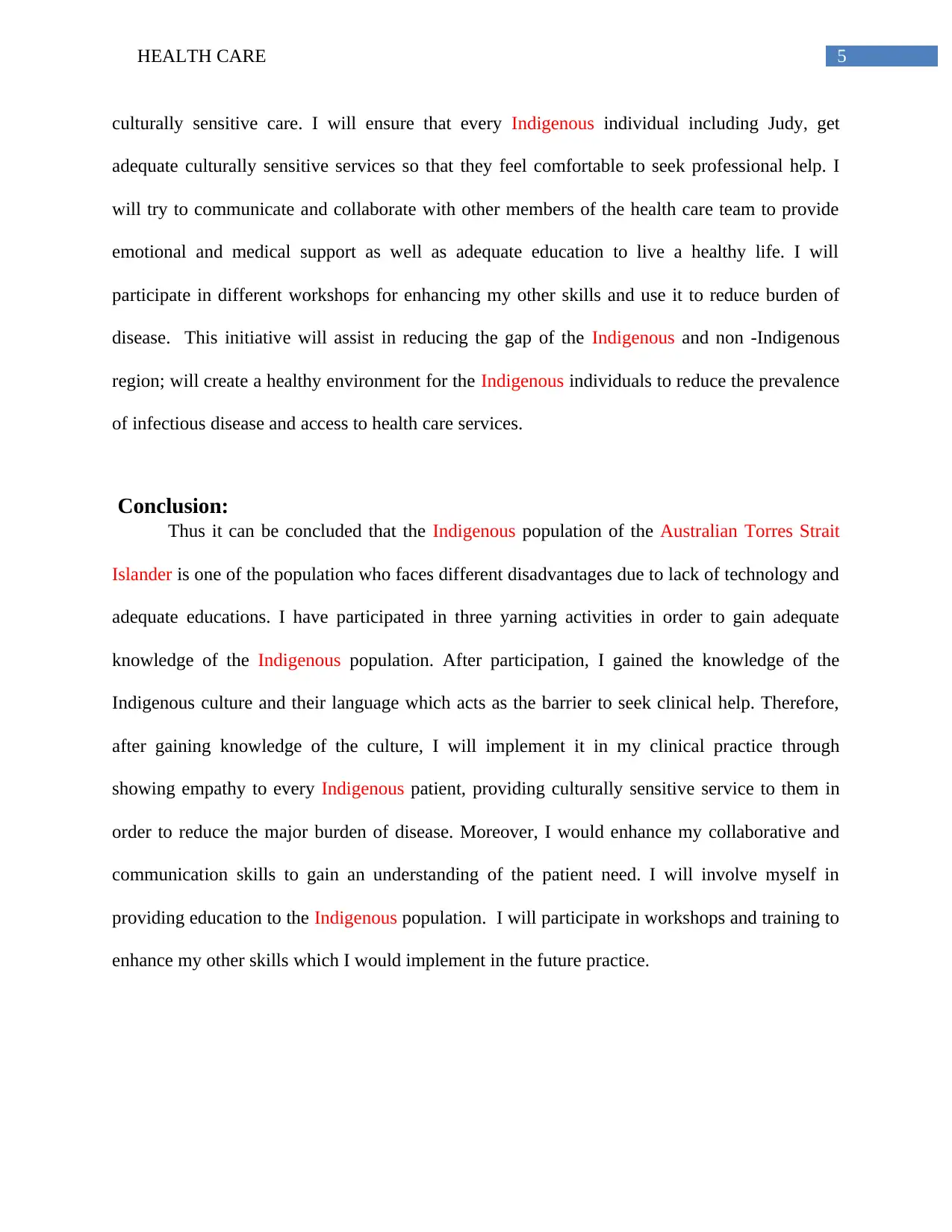
5HEALTH CARE
culturally sensitive care. I will ensure that every Indigenous individual including Judy, get
adequate culturally sensitive services so that they feel comfortable to seek professional help. I
will try to communicate and collaborate with other members of the health care team to provide
emotional and medical support as well as adequate education to live a healthy life. I will
participate in different workshops for enhancing my other skills and use it to reduce burden of
disease. This initiative will assist in reducing the gap of the Indigenous and non -Indigenous
region; will create a healthy environment for the Indigenous individuals to reduce the prevalence
of infectious disease and access to health care services.
Conclusion:
Thus it can be concluded that the Indigenous population of the Australian Torres Strait
Islander is one of the population who faces different disadvantages due to lack of technology and
adequate educations. I have participated in three yarning activities in order to gain adequate
knowledge of the Indigenous population. After participation, I gained the knowledge of the
Indigenous culture and their language which acts as the barrier to seek clinical help. Therefore,
after gaining knowledge of the culture, I will implement it in my clinical practice through
showing empathy to every Indigenous patient, providing culturally sensitive service to them in
order to reduce the major burden of disease. Moreover, I would enhance my collaborative and
communication skills to gain an understanding of the patient need. I will involve myself in
providing education to the Indigenous population. I will participate in workshops and training to
enhance my other skills which I would implement in the future practice.
culturally sensitive care. I will ensure that every Indigenous individual including Judy, get
adequate culturally sensitive services so that they feel comfortable to seek professional help. I
will try to communicate and collaborate with other members of the health care team to provide
emotional and medical support as well as adequate education to live a healthy life. I will
participate in different workshops for enhancing my other skills and use it to reduce burden of
disease. This initiative will assist in reducing the gap of the Indigenous and non -Indigenous
region; will create a healthy environment for the Indigenous individuals to reduce the prevalence
of infectious disease and access to health care services.
Conclusion:
Thus it can be concluded that the Indigenous population of the Australian Torres Strait
Islander is one of the population who faces different disadvantages due to lack of technology and
adequate educations. I have participated in three yarning activities in order to gain adequate
knowledge of the Indigenous population. After participation, I gained the knowledge of the
Indigenous culture and their language which acts as the barrier to seek clinical help. Therefore,
after gaining knowledge of the culture, I will implement it in my clinical practice through
showing empathy to every Indigenous patient, providing culturally sensitive service to them in
order to reduce the major burden of disease. Moreover, I would enhance my collaborative and
communication skills to gain an understanding of the patient need. I will involve myself in
providing education to the Indigenous population. I will participate in workshops and training to
enhance my other skills which I would implement in the future practice.
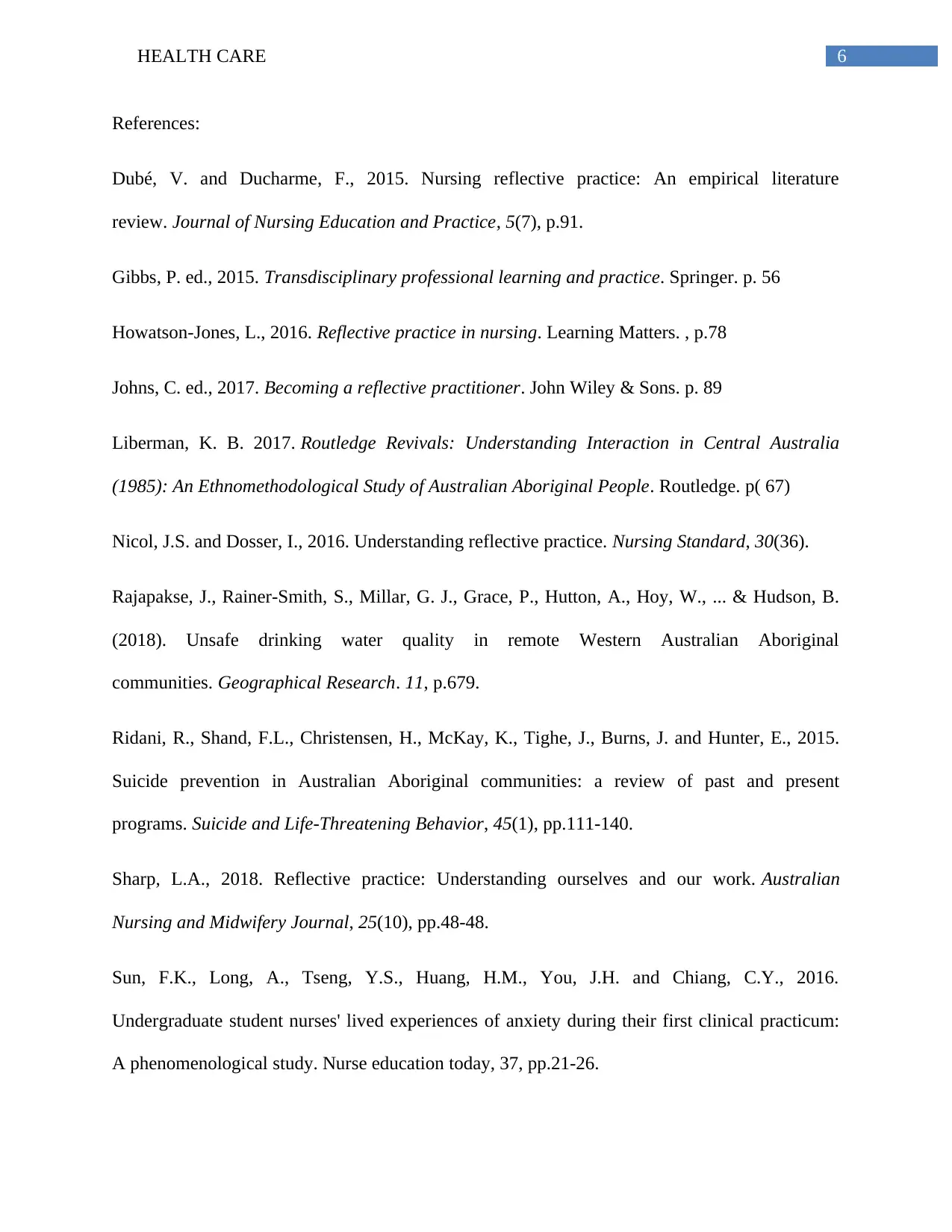
6HEALTH CARE
References:
Dubé, V. and Ducharme, F., 2015. Nursing reflective practice: An empirical literature
review. Journal of Nursing Education and Practice, 5(7), p.91.
Gibbs, P. ed., 2015. Transdisciplinary professional learning and practice. Springer. p. 56
Howatson-Jones, L., 2016. Reflective practice in nursing. Learning Matters. , p.78
Johns, C. ed., 2017. Becoming a reflective practitioner. John Wiley & Sons. p. 89
Liberman, K. B. 2017. Routledge Revivals: Understanding Interaction in Central Australia
(1985): An Ethnomethodological Study of Australian Aboriginal People. Routledge. p( 67)
Nicol, J.S. and Dosser, I., 2016. Understanding reflective practice. Nursing Standard, 30(36).
Rajapakse, J., Rainer‐Smith, S., Millar, G. J., Grace, P., Hutton, A., Hoy, W., ... & Hudson, B.
(2018). Unsafe drinking water quality in remote Western Australian Aboriginal
communities. Geographical Research. 11, p.679.
Ridani, R., Shand, F.L., Christensen, H., McKay, K., Tighe, J., Burns, J. and Hunter, E., 2015.
Suicide prevention in Australian Aboriginal communities: a review of past and present
programs. Suicide and Life‐Threatening Behavior, 45(1), pp.111-140.
Sharp, L.A., 2018. Reflective practice: Understanding ourselves and our work. Australian
Nursing and Midwifery Journal, 25(10), pp.48-48.
Sun, F.K., Long, A., Tseng, Y.S., Huang, H.M., You, J.H. and Chiang, C.Y., 2016.
Undergraduate student nurses' lived experiences of anxiety during their first clinical practicum:
A phenomenological study. Nurse education today, 37, pp.21-26.
References:
Dubé, V. and Ducharme, F., 2015. Nursing reflective practice: An empirical literature
review. Journal of Nursing Education and Practice, 5(7), p.91.
Gibbs, P. ed., 2015. Transdisciplinary professional learning and practice. Springer. p. 56
Howatson-Jones, L., 2016. Reflective practice in nursing. Learning Matters. , p.78
Johns, C. ed., 2017. Becoming a reflective practitioner. John Wiley & Sons. p. 89
Liberman, K. B. 2017. Routledge Revivals: Understanding Interaction in Central Australia
(1985): An Ethnomethodological Study of Australian Aboriginal People. Routledge. p( 67)
Nicol, J.S. and Dosser, I., 2016. Understanding reflective practice. Nursing Standard, 30(36).
Rajapakse, J., Rainer‐Smith, S., Millar, G. J., Grace, P., Hutton, A., Hoy, W., ... & Hudson, B.
(2018). Unsafe drinking water quality in remote Western Australian Aboriginal
communities. Geographical Research. 11, p.679.
Ridani, R., Shand, F.L., Christensen, H., McKay, K., Tighe, J., Burns, J. and Hunter, E., 2015.
Suicide prevention in Australian Aboriginal communities: a review of past and present
programs. Suicide and Life‐Threatening Behavior, 45(1), pp.111-140.
Sharp, L.A., 2018. Reflective practice: Understanding ourselves and our work. Australian
Nursing and Midwifery Journal, 25(10), pp.48-48.
Sun, F.K., Long, A., Tseng, Y.S., Huang, H.M., You, J.H. and Chiang, C.Y., 2016.
Undergraduate student nurses' lived experiences of anxiety during their first clinical practicum:
A phenomenological study. Nurse education today, 37, pp.21-26.
Paraphrase This Document
Need a fresh take? Get an instant paraphrase of this document with our AI Paraphraser
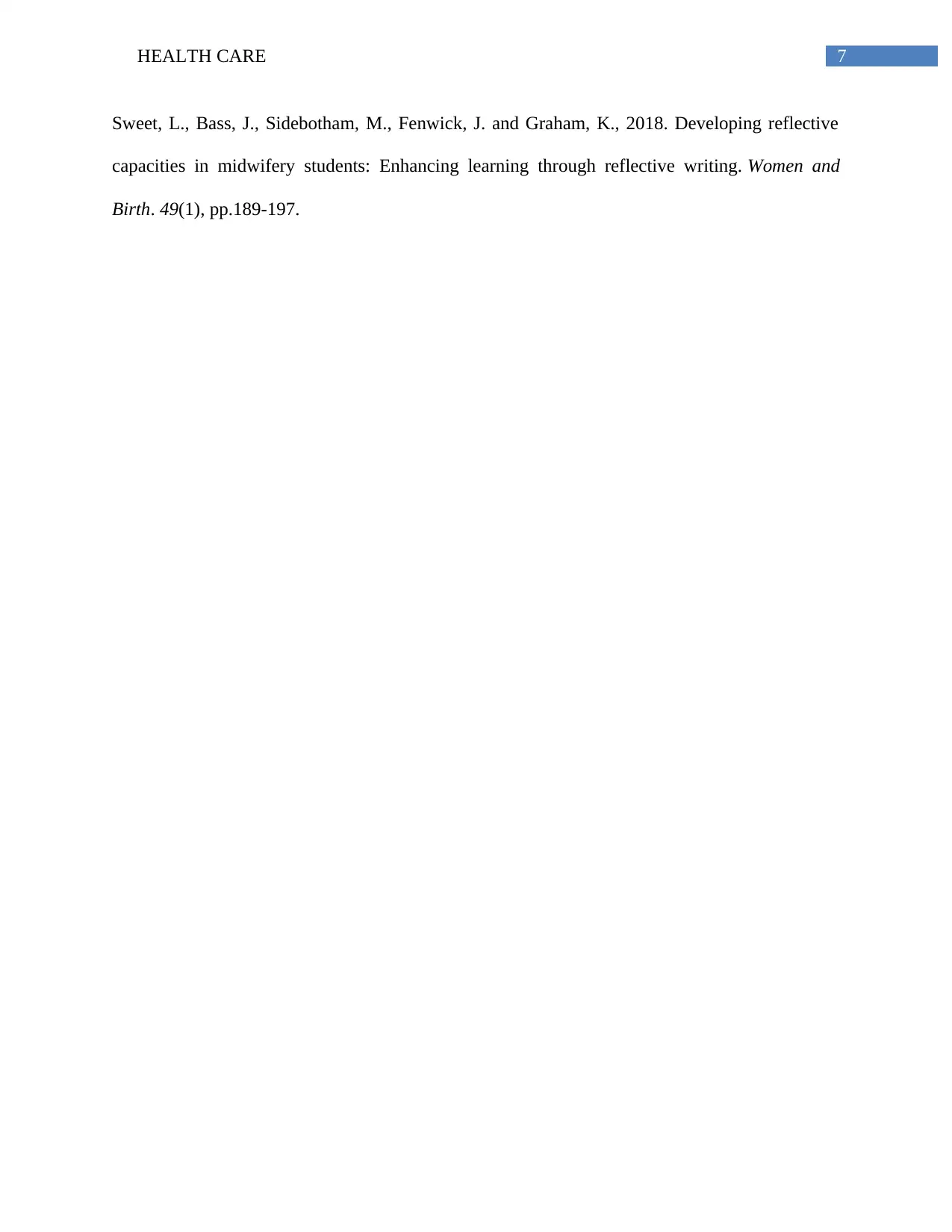
7HEALTH CARE
Sweet, L., Bass, J., Sidebotham, M., Fenwick, J. and Graham, K., 2018. Developing reflective
capacities in midwifery students: Enhancing learning through reflective writing. Women and
Birth. 49(1), pp.189-197.
Sweet, L., Bass, J., Sidebotham, M., Fenwick, J. and Graham, K., 2018. Developing reflective
capacities in midwifery students: Enhancing learning through reflective writing. Women and
Birth. 49(1), pp.189-197.
1 out of 8
Related Documents
Your All-in-One AI-Powered Toolkit for Academic Success.
+13062052269
info@desklib.com
Available 24*7 on WhatsApp / Email
![[object Object]](/_next/static/media/star-bottom.7253800d.svg)
Unlock your academic potential
© 2024 | Zucol Services PVT LTD | All rights reserved.





